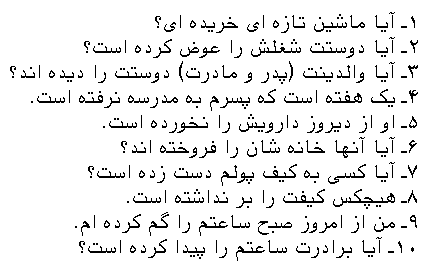As you know, practice makes perfect! These useful drills present even more words and phrases than covered in this week’s lesson. This will not only build your Persian vocabulary, but also help you learn to read and write Farsi more quickly and confidently.
Note: Before doing these homeworks, make sure you have learned the previous words fluently.
New words:
Shoghl ValedeinAlso ![]() /pedær-o- ma:dær/ (mostly in daily conversation).
/pedær-o- ma:dær/ (mostly in daily conversation).
Wallet/Purse = ![]() /ki:f-e- pu:l/.
/ki:f-e- pu:l/.
Please translate the following sentences into Persian.
- Have you bought a new car?
- Has your friend changed his job?
- Have your parents seen your friend?
- My child hasn’t gone to school for one week.
- She hasn’t eaten (taken) her medicine since yesterday.
- Have they sold their house?
- Has anyone touched my wallet?
- No one has taken your bag.
- I have lost my watch since this morning.
- Has your brother found my watch?

Tanvir Muraad
May 29, 2013 @ 12:51 pm
I was wondering, if we could use tabdeel for change instead of avaz.tabdeel is very common in afghanistan and pakistan.
A. Nick
May 30, 2013 @ 9:01 pm
Hello,
In sentence 5 (and some of the lessons before), why دارویش and not دارواش ?
I know it’s a bit late I ask, but better to ask than to wonder, right…
Thanks for the feedback.
mohammad
August 19, 2013 @ 10:34 pm
darooyash is true because the syllable “ash” tells that who it belongs to
Madarash=His/her mother
medadash=His/her pencil
Or we can say: Darooye oo(oo means He/she),madare oo,medade oo
A. Nick
August 21, 2013 @ 8:36 pm
Thanks you Mohammad,
Small follow up question, do you know why sometimes “-ish” is used instead of “-ash” as in the example (look at my post last two characters of Persian words).
ariane alana
August 17, 2013 @ 6:35 pm
Dear Hassan (or fellow learners), why is no.8 “Hich kes kifat ra bar nadashteh ast” instead of “bardashteh ast”? It would be “Noone has not taken your bag” then (double negative). Is the rule so in Farsi? Thank you.
mohammad
August 19, 2013 @ 10:35 pm
Bar nadashte is negative
Élise
January 2, 2017 @ 7:39 pm
I think that yes, Persian has double negative.
J.m
February 2, 2014 @ 9:40 am
Verey nice teacher
Kyle
August 13, 2014 @ 8:32 pm
For Sentence 1 where does the ای come from after تازه ?
Thank you!
Shakir Moledina
June 30, 2015 @ 10:35 am
That’s because it’s A new car and not specific. The “alif yaa” part is to indicate that it’s not specific. You could say yek mashine tazeh.